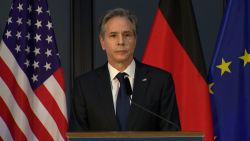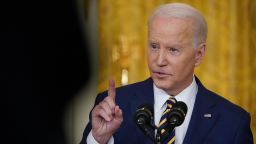Escalating psychological warfare between the United States and Russia over Ukraine is fast approaching a point at which a peaceful exit from a crisis with real-world ramifications for Americans could be impossible.
President Joe Biden, backed by the full symbolic power of the Western alliance, is locked in a showdown with Russian President Vladimir Putin, who is using Ukraine as a hostage to try to force the US to renegotiate the settled outcome of the Cold War. Neither man is blinking. To do so may be unfeasible, given the huge political stakes both have wagered.
The showdown in Eastern Europe might feel like someone else’s problem as Americans face a pandemic and high inflation, and wage their own political battles. And Biden has already said he won’t send US troops to non-NATO Ukraine.
But the reality is that the world’s two top nuclear powers are dueling out their most tense test of wills since the fall of the Soviet Union. A Russian invasion of Ukraine could trigger the biggest clash of regular conventional armies in Europe since World War II. At stake for Americans are the credibility of the West, perceptions of US global power and the possibility of secondary consequences that hit hard at home – for instance, a crisis-fueled spike in energy prices.
To try to pull back from the brink, Secretary of State Antony Blinken and Russian Foreign Minister Sergey Lavrov meet in Geneva on Friday.
As the meeting in Geneva began, Lavrov told Blinken that Moscow is “not expecting a breakthrough” from the talks but does expect “answers to our proposals.”
The US is not dropping its refusal to accept concessions demanded by Putin that would severely compromise NATO. And US threats of unprecedented, punishing sanctions on Russia if it invades plus efforts to offer Putin an off-ramp have not worked. In fact, the government in Kyiv says Russia has nearly completed the buildup of forces that would permit a full-scale invasion.
The strongman in the Kremlin, who has 100,000 troops on Ukraine’s borders, is keeping the world guessing with a game of great power poker. That’s exactly how Putin, who lives to knock adversaries off balance, likes it. Some analysts believe the Russian leader is bluffing and created the invasion threat to win equal superpower billing in talks with the US. Others see a bid to destabilize Ukraine short of an invasion or a nationalist play for popularity at home. But Putin may also sense weakness in the US and division in Europe, and reason that if he’s ever to crush Ukraine’s hopes of a pro-Western future, now is the time.
With the US refusing his demands, and with so much of his prestige wrapped up in the crisis, it seems unlikely that he’ll just pack up and go home.
“The only thing I’m confident of is that decision is totally, solely, completely, a Putin decision,” Biden said during a White House news conference Wednesday. “Nobody else is going to make that decision; no one else is going to impact that decision. He’s making that decision.”
Why Ukraine is so important to Putin
To understand that decision, it’s necessary to appreciate why Ukraine is so important to the Russian leader. For the former KGB officer, the demise of the Soviet Union was a historic disaster. He interpreted NATO’s eastward expansion as the humiliation of a great civilization. This explains why he has demanded concessions Biden can never accept – including an assurance that Ukraine never join NATO and a demand for the removal of Western troops and armaments from former Warsaw Pact states like Poland and Romania that he sees as a threat to Russian security.
Over the last decade or so, Putin has sought to re-create Russia’s old sphere of influence over former Soviet states like Ukraine. The scheme resulted in the annexation of Crimea, sovereign Ukrainian territory, in 2014. More recently, Putin backed the suppression of political protests in Belarus and Kazakhstan. Given his own autocratic regime, it’s also clear that a thriving, prosperous, Western-oriented democracy in Ukraine is intolerable. It might become an example to emulate for Russians tired of his long rule, corruption and repression.
Biden’s news conference will be remembered for a gaffe in which he suggested the full weight of sanctions against Russia might not be imposed if Putin engineered only a “minor incursion,” a statement the President rowed back Thursday. But it also featured a candid exposition by Biden on Putin’s motives. The President speculated the Russian leader was fighting to avenge history and for a 21st-century role for Russia. “The Berlin Wall came down, the empire has been lost, the near abroad is gone, etc. The Soviet Union has been split,” Biden said, guessing at Putin’s worldview.
“But think about what he has,” the President continued. “He has eight time zones, a burning tundra that will not freeze again naturally, a situation where he has a lot of oil and gas, but he is trying to find his place in the world between China and the West.”
Another component of Putin’s Russian restoration project is tarnishing the prestige of the West and especially the United States, a secondary goal of the Ukraine gambit. That’s also where his election-meddling efforts come in. While there are arguments about whether his intervention in favor of Donald Trump and against Democratic nominee Hillary Clinton was decisive in 2016, it did unleash destructive political forces inside the US. The candidate he supported, and who genuflected before him as President, is now leading an assault on American democracy that coincides with Putin’s goals. And Biden is weakened at home during the Ukraine showdown because Trump ensured that he is seen as an illegitimate President by millions of citizens. Putin can never have hoped for such an outcome.
Biden’s strategy
Putin’s challenges help explain Biden’s approach to the crisis. He spent weeks trying to unite the Western allies, which Putin is trying to divide, on a package of sanctions that would effectively cut off Russia from the Western economy. This is why Biden’s comments on Wednesday were so damaging – because he basically admitted the West wasn’t on the same page. But he was also telling the truth. French President Emmanuel Macron, for instance, this week called for a European channel to Putin, offering a divide with the US for the Russian leader to exploit.
As well as promising sanctions that would rupture many of Russia’s links with the developed world, Biden appears to be playing a risky mind game with Putin as he tackles his lonely decision. He sketched a picture of a prolonged, bloody insurgency in Ukraine at a time when Washington is mulling an effort to arm the Kyiv government as it did the Afghan Mujahedeen who ousted the Soviet Union from Afghanistan in the 1980s.
“You can go in and, over time, at great loss and economic loss, go in and occupy Ukraine. But how many years? One? Three? Five? Ten? What is that going to take? What toll does that take? It’s real. It’s consequential,” Biden said Wednesday. The chances of a quagmire in Ukraine must weigh on Putin, given his sensitivity to political opposition and the high numbers of conscripts in the Russian military who might start coming home in body bags. It might also augur a more limited incursion by special and irregular forces and intelligence assets.
One of the most curious aspects of the US approach to the Ukraine crisis has been the alarmist US rhetoric about an imminent invasion, and leaking of intelligence reports about the Russian buildup. It’s hard to say whether the administration is providing political cover for itself to show it’s not been caught by surprise if Russian tanks cross the border. Washington could also be emphasizing the threat in order to coerce Europeans into sanctions threats. For instance, the US has long been at odds with Germany over the Nord Stream 2 pipeline built to carry Russian gas to Western Europe. The new government in Berlin has now signaled it would halt the gas flow if Russia invades Ukraine. At times, however, it has seemed as though the US has almost been goading Putin with its statements about a likely invasion – including those by Biden on Wednesday. Such a tactic might increase the pressure on the Russian leader – but it’s a huge gamble.
Republicans pounce on Biden
But Putin is not the only one under huge political duress. Biden is too.
A Russian invasion would represent a grave challenge to Europe – which still relies on the US as its security guarantor – creating a consuming foreign-policy headache for a presidency already reeling from crises. World politics would be rocked by an ostracized Russia even more determined to frustrate Washington’s goals. Biden might have to rush troops to reinforce NATO allies in the Baltic in order to deter further Russian expansionism. And a new European standoff would distract the US from its main strategic struggle in the coming decades: the global challenge posed by China.
Furthermore, the principles that underpin American leadership of a community of free nations would be shattered if a strongman can destroy a smaller democracy without consequences. China and Taiwan, especially, will be watching how the US responds.
The crisis has far-reaching domestic implications as well.
If Putin invades now, Biden will look weak. He’s already come across as constantly catching up to Putin’s pacesetting. His summit with the Russian leader in Geneva last year will be branded by critics as appeasement. His plight would be a gift for Republicans portraying him as confused and bumbling ahead of midterm elections this year and the presidential election in 2024.
Senate Minority Leader Mitch McConnell gave a taste of those attacks on Thursday, describing Biden’s comments about a possible “minor incursion” by Russia as “bizarre and devastating.”
“Why is our President speculating like a passive observer on the sidelines? He isn’t a pundit. He isn’t Putin’s psychoanalyst. He’s the President of the United States,” the Kentucky Republican said.
His disdainful critique emphasized how Biden, just like Putin, cannot afford to lose the test of wills that will play out in the tense days to come.























